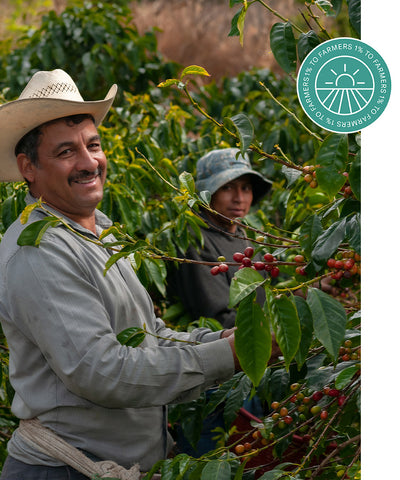But What About The Farmers?

When we talk about coffee minus the beans, one of the first things people wonder is, what about the coffee farmers? We think it’s a really important question. It’s a question that kept us up at night often as we wondered if our solution could help the planet and reinvent coffee, without leaving millions of people worse off., while also supporting farmers. We want to let you in on that path forward.
As climate conditions continue to worsen and the planet warms, coffee farmers are suffering the most, and they are looking for options. Smallholder farmers produce most of the world’s coffee ; however, 80% of coffee farmers live below the poverty line. In the long and inefficient value chain of coffee, farmers end with just 10% of the final value of your cup of coffee.
As we study the science and data behind climate change’s effect on coffee production, we know production will only continue to worsen, so we have spent time considering coffee farmers and their livelihoods, and our role in supporting them.
We have explored many ideas, from financing the education of coffee farmers’ sons and daughters so they can move into other industries to offering crop insurance to help them recover from natural disasters. After months of research, we decided to start with a pilot to support coffee farmers' transition into agroforestry systems and intercropping focusing on climate-resilient crops. Agroforestry and intercropping are better agricultural practices for the planet since they encourage biodiversity instead of monocultures, and they are better for farmers since they can diversify income and risk.
We are partnering with Doselva to help finance farmers’ transition from solely producing coffee to intercropping, investing in more climate resilient crops that will provide them with higher prices per pound.
Why Doselva?

Doselva is a turn-key solution to unlock smallholder farmer participation in high-value, high-volume spice markets. They operate in Nicaragua, and Honduras and will expand to other countries.
Doselva supports farmers by: providing access to capital to finance the transition to intercropping, sourcing high-quality seeds and inputs, and offering agricultural technical support. Most importantly, they buy the spices from them to sell in the US market.
This last piece is key because we have seen many other projects that encouragetransitions to intercropping but provide no support in commercializing those crops, which can sometimes leave farmers with higher risk exposure and wasted products. Therefore, we appreciate Doselva’s full-stack solution of helping farmers transition into intercropping and connecting them within the value chain to ensure they can place their products.
This program allows farmers to:
- Diversify their income by producing multiple crops
- Decrease their risk exposure to climate change, market volatility, and supply chain fragility
- Double and, at times, triple their income by focusing on crops that pay higher $/pound.
Doselva has already helped hundreds of farmers transition into this system and is looking to expand its reach to more farmers and countries.
With our limited beta launch, we will donate 1% of our revenues to Doselva, and we will conduct a pilot program during the 2023 harvest.





Leave a comment